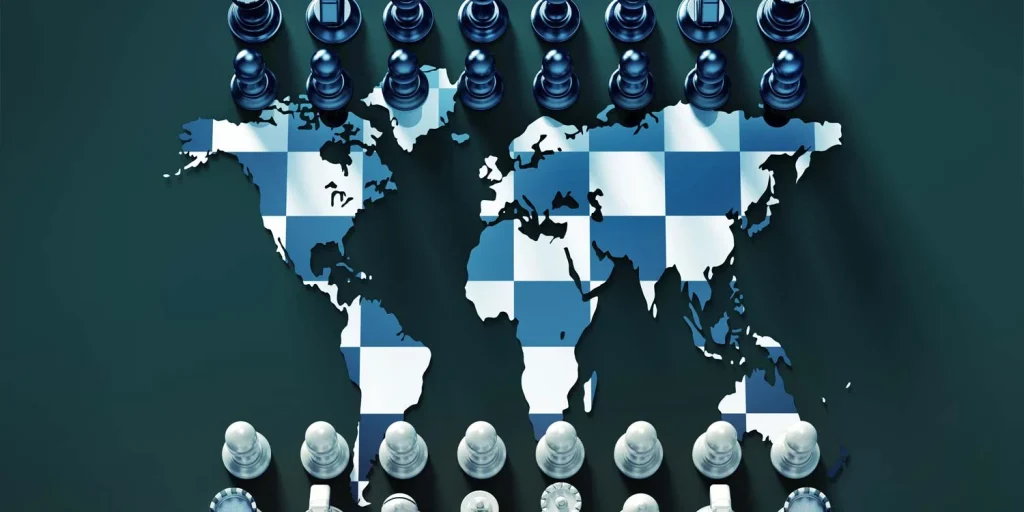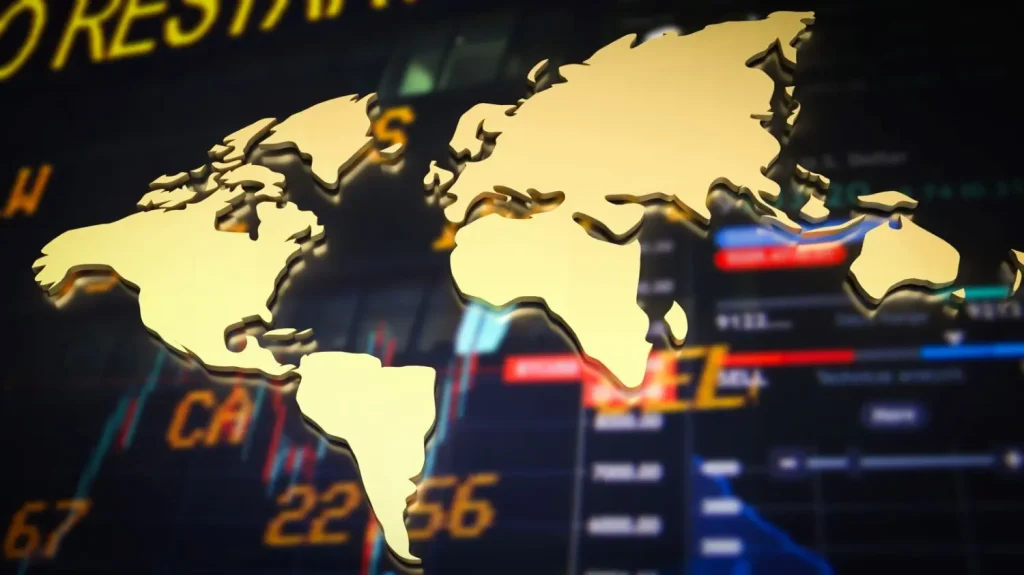
ភាពតានតឹងភូមិសាស្ត្រនយោបាយកើតឡើងនៅពេលដែលមានជម្លោះអន្តរជាតិ ក៏ដូចជាការដណ្តើមអំណាចពីគ្នាទៅវិញទៅមក ដែលអាចបណ្តាលឱ្យមានការខូចខាតយ៉ាងធ្ងន់ធ្ងរមិនត្រឹមតែដល់សេដ្ឋកិច្ចតែមួយប៉ុណ្ណោះទេ ប៉ុន្តែក៏រួមជាមួយនឹងអ្នកដែលពាក់ព័ន្ធទាំងឡាយ។ ខណៈពេលដែលវាអាចឈានទៅរកការផ្ទុះសង្រ្គាម វាក៏អាចឈានទៅរកជម្លោះផ្សេងៗទៀតរួមមានជម្លោះការទូត ការប្រកួតប្រជែងសេដ្ឋកិច្ច ឬជម្លោះទៅលើភាពខុសគ្នាខាងមនោគមវិជ្ជានោះដែរ។
ដូច្នេះ តើយើងកំពុងមានជម្លោះអ្វីនៅពេលនេះ?
ជាក់ស្តែងនាពេលបច្ចុប្បន្នមានជម្លោះភូមិសាស្ត្រនយោបាយ និងភាពតានតឹងផ្សេងៗទៀតដូចជា សង្គ្រាមមជ្ឈិមបូព៌ា សង្គ្រាមរុស្ស៊ី និងអ៊ុយក្រែន ច្រកសមុទ្រតៃវ៉ាន់ (តៃវ៉ាន់ និងចិន) សង្គ្រាមពាណិជ្ជកម្មរវាងអាមេរិក និងចិនជាដើម។

ប៉ុន្តែតើសង្គ្រាមនេះប៉ះពាល់ទៅដល់ស្ថានភាពសេដ្ឋកិច្ចដល់កម្រិតណា?
សង្គ្រាមទាំងនេះផ្តល់ផលប៉ះពាល់ដូចជា៖
- ផលប៉ះពាល់លើពាណិជ្ជកម្ម៖ វាជះឥទ្ធិពលទៅលើខ្សែសង្វាក់ផ្គត់ផ្គង់សកល ពោលគឺប្រឈមមុខនឹងបញ្ហាផ្នែកដឹកជញ្ជូន ឬការរឹតបន្តឹងទៅលើកាជួញដូរជាដើម។ នេះបានធ្វើឱ្យតម្លៃផលិតផលពាណិជ្ជកម្មឡើងថ្លៃ ជាពិសេសនៅពេលដែលយើងពិចារណាទៅលើសង្គ្រាមរវាងរុស្ស៊ី-អ៊ុយក្រែន។ ខណៈពេលដែលភាពតានតឹងរវាងចិន និងតៃវ៉ាន់អាចបង្កហានិភ័យខ្លះដល់សង្វាក់ផ្គត់ផ្គង់បច្ចេកវិទ្យាវិញ។ លើសពីនេះ គោលនយោបាយថ្មីរបស់ប្រធានាធិបតីនឹងបន្តធ្វើឱ្យមានសង្រ្គាមពាណិជ្ជកម្មបន្ថែមទៀត។ មិនត្រឹមតែសម្រាប់ប្រទេសចិនដែលជាដៃគូពាណិជ្ជកម្មនោះទេ សូម្បីតែ BRICS ដែលកំពុងព្យាយាមបន្ទាបតម្លៃដុល្លារអាមេរិកក៏អាចប្រឈមមុខនឹងបញ្ហានេះដែរ។ ដូច្នេះ គេជឿជាក់ថាអាចនឹងមានការកើនឡើងនៃសម្ពាធអតិផរណាកាន់តែខ្ពស់ ដែលអាចបន្ថយល្បឿននៃកំណើនសេដ្ឋកិច្ចឱ្យកាន់តែយឺតនោះដែរ។ បញ្ហានោះគឺបញ្ហាកង្វះតម្រូវការ។ ចុងក្រោយ ទាំងនេះមិនត្រឹមតែជះឥទ្ធិពលអវិជ្ជមានចំពោះប្រទេសនាំចេញប៉ុណ្ណោះទេ ប៉ុន្តែប្រសិនបើពួកគេប្រើប្រាស់មធ្យោបាយនេះមិនត្រឹមត្រូវនោះសេដ្ឋកិច្ចទាំងពីរនឹងដួលរលំឬប្រឈមមុខនឹងបញ្ហាខ្ពស់ជាមិនខាន។
- ផលប៉ះពាល់លើការវិនិយោគ៖ ភាពមិនច្បាស់លាស់ទៅលើស្ថានភាពសេដ្ឋកិច្ចជាពិសេសនៅក្នុងអំឡុងពេលមានសង្គ្រាមអាចនឹងរារាំងលើការវិនិយោគផ្ទាល់ពីបរទេស ដោយសារហានិភ័យខ្ពស់ពេកសម្រាប់ពួកគេ។ វាប្រៀបដូចជាឥទ្ធិពលដូមីណូ ដែលចាប់ផ្តើមពីការបាត់បង់នូវលំហូរនាំចូលមូលធន ទៅរកការបន្ទាបចំនួនការងារ រហូតដល់មានការរំខាននិងការបន្ថយកំណើនសេដ្ឋកិច្ច។ ឥឡូវនេះ ប្រជាជនមានការព្រួយបារម្ភអំពីឥទ្ធិពលបន្ទាប់របស់សង្គ្រាមដែលបានបញ្ចប់ទៅលើកំណើនសេដ្ឋកិច្ច ដែលអាចបន្តធ្វើឱ្យប្រជាជននៅទីនោះប្រឈមមុខនឹងបញ្ហាផ្សេងៗទៀត។ ជាពិសេសការពិចារណាលើបទឈប់បាញ់នាពេលថ្មីៗនេះ (បន្ត និងបញ្ឃប់បទឈប់បាញ់) រវាងអ៊ីស្រាអែល និងលីបេន។
- ផលប៉ះពាល់លើទីផ្សារហិរញ្ញវត្ថុ៖ អស្ថិរភាពនយោបាយ និងសេដ្ឋកិច្ចនេះនឹងជំរុញឱ្យវិនិយោគិនមានទំនោរទៅរកទ្រព្យសម្បត្តិដែលមានសុវត្ថិភាពជាងមុនដូចជា មាសជាដើម។ ពោលគឺនឹងធ្វើឱ្យតម្លៃមាសកាន់តែឡើងខ្ពស់ ខណៈដែលទ្រព្យសកម្មផ្សេងទៀតដូចជាទិន្នផលសញ្ញាប័ណ្ណ ភាគហ៊ុន ឬតម្លៃរូបិយប័ណ្ណនឹងមានប្រតិកម្មផ្ទុយគ្នា។
ដូច្នេះសរុបមក ទាំងអស់នេះកំពុងបង្កើនហានិភ័យនៃការកើនឡើងអតិផរណា តម្រូវការ និងការរំខាននៃការផ្គត់ផ្គង់ដែលនឹងនាំទៅរកការធ្លាក់ចុះនៃសេដ្ឋកិច្ច។
ឱកាសវិនិយោគ
ទោះបីជាភាពតានតឹងផ្នែកភូមិសាស្ត្រនយោបាយអាចចាត់ទុកថាជាស្ថានភាពរំខាន ឬសុបិន្តអាក្រក់សម្រាប់មនុស្សជាច្រើន ជាពិសេសចំពោះប្រទេសអ្នកនាំចេញ ឬអ្នកវិនិយោគក៏ដោយ ក៏មានឱកាសជាច្រើនដែលវិនិយោគិនមិនគួរមើលរំលងនោះដែរ។
មិនមែនភាគហ៊ុនទាំងអស់សុទ្ធតែមិនល្អក្នុងអំឡុងពេលមានសង្រ្គាមនោះទេ វិនិយោគិនក៏អាចបង្កើតឱកាសវិនិយោគក្នុងវិស័យដូចជា វិស័យការពារជាតិ សន្តិសុខតាមអ៊ីនធឺណិត ឬហេដ្ឋារចនាសម្ព័ន្ធសំខាន់ៗដែលទំនងជាទទួលបានផលចំណេញច្រើនក្នុងអំឡុងពេលនេះ។ ម៉្យាងវិញទៀត មាសជាទ្រព្យសម្បត្តិដែលមានសុវត្ថិភាពក៏មានប្រជាប្រិយភាពខ្លាំងក្នុងចំណោមអ្នកវិនិយោគ ទំនិញផ្សេងទៀតដូចជាប្រេង ឧស្ម័ន ឬលោហៈដ៏មានតម្លៃ ដែលអាចជួយកាត់បន្ថយហានិភ័យផងដែរ។ លើសពីនេះទៀត វិនិយោគិនក៏អាចពិចារណាលើការប្រើប្រាស់ទៅលើ CFDs ដែលពួកគេអាចធ្វើការទិញ ឬលក់ទៅតាមទិសដៅរបស់ទីផ្សារនាពេលនោះ។ នេះមានន័យថាប្រសិនបើអ្នកចង់ជួញដូររូបិយប័ណ្ណ ហើយរំពឹងថានឹងធ្លាក់ចុះ អ្នកក៏អាចលក់រូបិយប័ណ្ណដើម្បីទទួលបានប្រាក់ចំណេញសមរម្យផងដែរ។ សម្រាប់ប្រតិបត្តិការអាជីវកម្ម ពួកគេក៏អាចពិចារណាលើការទិញទំនិញទុកមុនដើម្បីទទួលបានប្រាក់ចំណេញកាន់តែប្រសើរនៅពេលតម្លៃកើនឡើង។
ទោះជាយ៉ាងនេះក្តី វិនិយោគិនត្រូវមានការប្រុងប្រយ័ត្នជាមុន ព្រោះទីផ្សារអាចមានបម្រែបម្រួលខ្លាំងដោយមិនបានគ្រងទុកមុន។ នេះក៏មានន័យថាវិនិយោគិនគួប្បីតាមដានទៅលើព័ត៌មានផ្សេងៗ ព្រមទាំងធ្វើការផ្លាស់ប្តូរយុទ្ធសាស្ត្រ ដើម្បីកាត់បន្ថយហានិភ័យដែលអាចកើតមានឡើង។
(English Version)

Geopolitical tension occurs from a strain of international conflict or the power snitch from being inferior/supreme, which will ultimately result in severe damage not only to one side of the economy but also to those who are involved. While it can escalate to armed conflict such as a war outbreak, it often has a broader range of tensions between countries such as diplomatic disputes, economic competition, or ideological differences.
So what are the conflicts we are having right now?
Let’s count on major geopolitical conflicts and tensions currently are the Middle East war, the Russia and Ukraine War, the Taiwan Strait (Taiwan and China), Trade war between US-China Relations, for instance.

But to what degree does this war affect the economic outlook?
There are various effects that this could potentially influence such as:
- Impact on trade: This brings more disruption to global supply chains, logistical challenges, or trade restrictions which lead to higher prices on trading products, especially when we consider the Russia-Ukraine conflict. Meanwhile, tension between China and Taiwan could pose some risks to technology supply chains. And most of all, Trump’s new heavily levied policy will continue to spark an ongoing trade war, not only with China as their main competitor but also with BRICS which seeks to devalue the Dollar currency. So a potential high inflationary pressure on consumption which also means overpricing products will ultimately slow down the economic growth due to lack of demand. In the end, it not only negatively affects exporter countries, but if this is not done right, then both economies will collapse, sooner or later.
- Impact on Investment: Uncertain economic outlook especially during war outbreaks will hinder foreign direct investment (FDI) as this will bring unstable or risk to economic outlook or business activities. This acts as a domino effect that starts from having a lack of capital inflow to lesser job creation to demand disruption and forcing the growth to decline. Now people are concerned about the after-effects of war on economic growth that may prolong the suffering of their citizens. Especially considering a recent ceasefire (on and off ceasefire) between Israel and Lebanon.
- Impact on Financial Markets: This instability political and economic will enforce more attention toward safe-haven assets such as GOLD, making its price rise high while other underlying assets such as bond yield, stock, or currency value will react differently.
So to sum up, all of these are heightening the risk of spiking inflation, demand, and supply disruption which will lead to economic degrowth.
Investment Opportunities
Although geopolitical tensions will often be seen as a disruptive situation and a nightmare to many, especially to exporter countries, or investors, there are plenty of potential opportunities that investors shall never overlook.
Not all stocks are bad during a war outbreak, investors can also create investment opportunities in sectors such as defense, cybersecurity, or critical infrastructure that are very likely to be profitable during this period. While GOLD as a safe-haven asset is also very popular among investors, other commodities such as oil, gas, or precious metals can help mitigate risk as well. Additionally, investors may also consider using derivative security through CFDs that can walk both ways—buy and sell, meaning that if you want to trade the currency and expect to decline, you can also sell the currency to gain a reasonable profit. As for business operations, they may also consider purchasing up-front goods to gain a better profit when the price rises.
Regardless, investors should be pre-cautious as a sharp market fluctuation could be triggered without notice. This means that staying up-to-date with news and being very flexible in investment adjustment would be very essential to reduce the risk associated.

